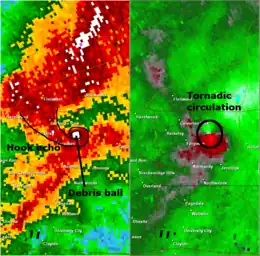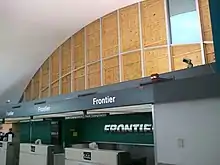2011 St. Louis tornado
On April 22, 2011, a violent EF4 tornado, with winds of 170 mph (270 km/h), struck the St. Louis metropolitan area.[2] The tornado, which was the strongest to hit St. Louis County or City since January 1967, moved through many suburbs and neighborhoods, damaging and destroying many homes and businesses. The worst damage was in the Bridgeton area, where a few homes were completely leveled.[3] In its 21.3-mile (34.3 km)[4] track across the St. Louis metropolitan area, the tornado damaged thousands of homes, left thousands without power, and caused heavy damage to St. Louis Lambert International Airport, closing it for nearly 24 hours.[5] The tornado crossed into Illinois and tore the roofs off homes in Granite City before dissipating. The tornado was part of a period of high tornado activity that preceded the 2011 Super Outbreak.
| EF4 tornado | |
|---|---|
 Radar imagery of the supercell that produced the St. Louis tornado. | |
| Formed | April 22, 2011 7:59 p.m. CDT (00:59 UTC) |
| Duration | 32 minutes |
| Dissipated | 8:31 p.m. CDT (01:31 UTC) |
| Highest winds |
|
| Max. rating1 | EF4 tornado |
| Fatalities | 0 fatalities; 5 injuries |
| Damage | >$250 million (2011 USD)[1] |
| Power outages | 54,000 |
| Areas affected | St. Louis, Missouri area (part of a larger outbreak) |
Part of the tornado outbreak sequence of April 19–24, 2011 1Most severe tornado damage; see Enhanced Fujita scale | |
Tornado summary

The tornado touched down to the northwest of Creve Coeur Lake along Creve Coeur Mill Road at 7:55 PM (00:59 UTC).[6] Damage was initially limited to EF0-EF1 level damage to trees along Creve Coeur Mill Road. The tornado began moving east, first reaching EF2 intensity near a golf club house, where a flag pole and light were pushed over.[7] The tornado briefly weakened to EF1 before reaching EF3 intensity in a subdivison in the northern part of Maryland Heights, where most walls of a house were collapsed. EF2 damage was also found in areas around the house, with EF1 damage in the northern part of the neighborhood along the edge of the track.[8] Low-end EF2 damage continued further east. After crossing Highway 270, the tornado weakened to EF1 intensity as it impacted more homes on the other side of the highway. As the tornado moved into Bridgeton, it reached EF4 intensity along the northern side of Old St. Charles Road, with several adjacent homes in this area being flattened.[9] A condo in the area was also heavily damaged by the winds, with a large portion of the roof and decking being torn off.[10] High-end EF3 damage was also reported at several houses at the end of Beaverton Drive, with most being flattened.[11] A power station and a few retail locations were also nearly flattened at EF3 intensity.[12]
The tornado weakened to a high-end EF1 as it crossed Highway 67 and Highway 70, damaging some houses in neighborhoods to the east [13] The tornado turned slightly north as it hit the eastern section of St. Louis Lambert International Airport at around 8:10 PM.[5] Concourse C had a large section of its roof torn off when the tornado struck. Many windows at the airport were blown out, and signs were damaged as well. Vehicles outside were tossed by the tornado, including a van which was partially pushed over the edge of a parking garage. Lambert Airport released surveillance video showing debris swirling inside the airport as people ran for cover.[14] It was reported that an aircraft was moved away from its jetway by the storm, with passengers still on board.[15] One plane from Southwest Airlines was damaged when the wind pushed a conveyor belt used for loading baggage into it. American Airlines said that four of its planes were damaged, two of them significantly. One was buffeted by 80 mph (130 km/h) crosswinds while taxiing in from a landing when the tornado hit and the other had possible damage to its landing gear.[16] The tornado was at EF2 intensity when it hit the airport.[2][14]
The tornado continued at low-end EF2 intensity as it moved into the suburbs of Berkeley, Kinloch and Ferguson, where many homes suffered roof loss, along with Berkeley High School, which did not suffer much damage, however, tree and outbuilding damage was reported around the edges of the property.[17] Homes on the western edge of Kinloch saw EF2 damage, while the Kinloch City Hall was narrowly missed. EF1 tree damage with occasional EF2 damage to structures continued through Kinloch and the eastern part of Berkeley. The tornado would move just to the north of the downtown area of Ferguson. A restaurant and church on Blackburn Avenue lost the majority of their roofing, with several windows being broken at the church.[18] More low-end EF2 damage was reported to houses northeast of downtown Ferguson. The tornado weakened back to EF1 intensity further east, where light damage was reported at the Griffith Elementary School. The tornado passed north of the main areas of Dellwood, where houses and trees would be damaged at EF1 intensity, however, some areas of EF2 damage was reported at several locations east of Dellwood, which included several large power poles that were snapped.[19] The tornado continued into the community of Bellefontaine Neighbors, where light to moderate roof damage was reported at several homes. Isolated low-end EF2 damage was found, but most damage was EF1-level in this area. Further east, trees and some homes suffered low-end EF1 damage. Light tree damaged occurred at North Riverfront Park before the tornado crossed the Mississippi River into Illinois.[20] Low-end EF1 damage would occur in areas west of Nameoki Township, with the tornado narrowly missing an industrial park along Highway 3. The tornado reached EF2 intensity for the last time in areas north of Maryland Place and Pontoon Beach, before dissipating just to the north of Pontoon Road at 8:31 PM.
Aftermath

More than 54,000 Ameren customers were left without power after the storm: more than 47,000 in Missouri and about 7,000 in Illinois.[21]
By 5:40 a.m. CDT on April 24, 21,667 customers in Missouri and 131 in Illinois were still without power.[22]
The St. Louis Lambert International Airport was closed by the FAA at 8:54 p.m. CDT (01:54 UTC), and reopened at temporarily reduced capacity on April 23. It was expected to be at 70% capacity on April 24.[2][23]
On April 24, the St. Louis Post-Dispatch reported more than 2,700 buildings were severely damaged in St. Louis County, including 900 in Bridgeton, 450 in Berkeley and 1,170 in Maryland Heights.[24]
Another tornado also hit New Melle in St. Charles County, about 30 miles west of the airport.[25][26]
No deaths resulted from the tornado, and only five people were injured.[27]
See also
References
- Missouri Event Report: EF4 Tornado (Report). National Centers for Environmental Information. National Weather Service Weather Forecast Office in St. Louis, Missouri. 2019. Retrieved April 20, 2021.
- "UPDATE: Lambert reopening today, expects to be at 70 percent capacity Sunday". St. Louis Post-Dispatch. April 23, 2011. Retrieved April 24, 2011.
- Moody, Cassidy (April 23, 2011). "Up to 200 homes damaged in Maryland Heights, Bridgeton". KSDK-tv5. Archived from the original on January 27, 2013. Retrieved April 24, 2011.
- "Good Friday Tornadoes April 22, 2011". NWS St. Louis. Retrieved 2 November 2012.
- Bowers, Cynthia (April 23, 2011). "Residents: St. Louis was "bedlam" during tornado". CBS News. Retrieved April 24, 2011.
- US Department of Commerce, NOAA. "St. Louis Good Friday Tornado". www.weather.gov. Retrieved 2023-10-19.
- "ArcGIS Web Application". apps.dat.noaa.gov. Retrieved 2023-10-19.
- "ArcGIS Web Application". apps.dat.noaa.gov. Retrieved 2023-10-19.
- "April 22, 2011, Saint Louis "Good Friday" Tornado". stormhorn.com. Retrieved 2023-10-19.
- "ArcGIS Web Application". apps.dat.noaa.gov. Retrieved 2023-10-19.
- "No deaths in St. Louis tornado called miracle on Good Friday". News Tribune. 2011-04-25. Retrieved 2023-10-19.
- "ArcGIS Web Application". apps.dat.noaa.gov. Retrieved 2023-10-19.
- "12 Years Later: Remembering the St. Louis area's Good Friday tornado". FOX 2. 2023-04-23. Retrieved 2023-10-19.
- Held, Kevin (April 23, 2011). "St. Louis Airport storm caught on camera". KSDK. Archived from the original on January 3, 2013. Retrieved April 23, 2011.
- Moore, Bryce. "Lambert passengers watch plane move, then evacuate terminal". Archived from the original on April 25, 2011. Retrieved April 23, 2011.
- CBS News (April 23, 2011). "Airlines cancel St. Louis flights after tornado". Archived from the original on 11 May 2011. Retrieved April 24, 2011.
- "ArcGIS Web Application". apps.dat.noaa.gov. Retrieved 2023-10-19.
- "Tornado hits Ferguson, North St. Louis County, at 8 pm on Friday, April 22, 2011". Missouri Group Against Smoking Pollution. 2011-05-01. Retrieved 2023-10-19.
- US Department of Commerce, NOAA. "St. Louis Good Friday Tornado". www.weather.gov. Retrieved 2023-10-19.
- "ArcGIS Web Application". apps.dat.noaa.gov. Retrieved 2023-10-19.
- Salter, Jim; Suhr, Jim (April 22, 2011). "Tornado spawned by strong storms causes damage, injuries at Lambert Airport in St. Louis". Retrieved April 24, 2011.
- Ameren Outage Map Archived 2011-03-04 at the Wayback Machine (April 24, 2011)
- Salter, Jim; Suhr, Jim (April 23, 2011). "Mo. governor surveys tornado-ravaged St. Louis, calls lack of deaths 'divine intervention'". Archived from the original on April 26, 2011. Retrieved April 24, 2011.
- Staff reports. "Tornado confirmed; 2,700 buildings in St. Louis County with serious damage".
- CBS News (April 23, 2011). "Mo. tornadoes destroy homes, damage airport". Retrieved April 24, 2011.
- April 22nd Tornadic Supercell Greater St. Louis Metropolitan Area, National Weather Service, St. Louis, Missouri. (April 23, 2011).
- Staff reports. "Disaster, miracle seen in swath of destruction".
External links
- NOAA information, with map of the tornado's track across St. Louis
- Security video of the airport's light rail platform during the storm
- Security video of the airport's heavily damaged C Concourse during the storm
- Eyewitness video shot inside the airport during the storm
- Local newspaper's video of damage inside the C Concourse, shot the following day
- Despite warning, St. Louis tornado caught airport, passengers off guard
- In St. Louis, pilot was unaware of approaching tornado
- Browning, Wes (2011). "Tornadoes in the St. Louis Area...A Historical Perspective" (PDF). Gateway Observer. St. Louis, Missouri: National Weather Service. 2 (2): 5–7. Archived from the original (PDF) on 2012-03-02. Retrieved 2011-12-27.
- Looking back: the Good Friday tornado of 2011